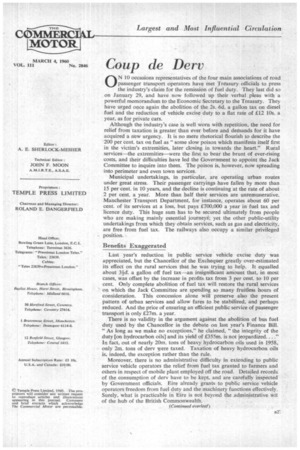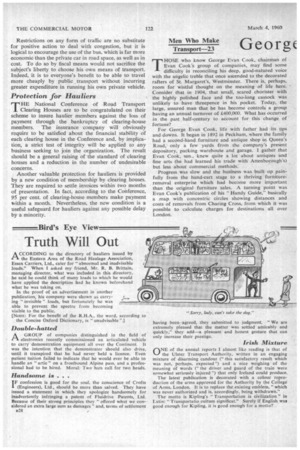Coup de Dery
Page 31

Page 32

If you've noticed an error in this article please click here to report it so we can fix it.
ON 10 occasions representatives of the four main associations of road passenger transport operators have met Treasury officials to press the industry's -claim for the remission of fuel duty. They last did so on January 29, and have now followed up their verbal pleas with a powerfu! memorandum to the Economic Secretary to the Treasury. They have urged once again the abolition of the 2s. 6d. a gallon tax on diesel fuel and the reduction of vehicle excise duty to a flat rate of f12 10s. a year, as for private cars.
Although the industry's case is well worn with repetition, the need for relief from taxation is greater than ever before and demands for it have acquired a new urgency. It is no mere rhetorical flourish to describe the 200 per cent, tax on fuel as "some slow poison which manifests itself first in the victim's extremities, later closing in towards the heart." Rural services—the extremities—were the first to bear the brunt of ever-rising costs, and their difficulties have led the Government to appoint the Jack Committee to inquire into them. The poison is, however, now spreading into perimeter and even town services.
Municipal undertakings, in particular, are operating urban routes under great stress. Their passenger carryings have fallen by more than 15 per cent. in 10 years, and the decline is continuing at the rate of about 2 per cent. a year. More than half their services are unremunerative. Manchester Transport Department, for instance, operates about 60 per cent. of its services at a loss, but pays 000,000 a year in fuel tax and licence duty. This huge sum has to be secured ultimately from people who are making mainly essential journey; yet the other public-utility undertakings from which they obtain services, such as gas and electricity, are free from fuel tax. The railways also occupy a similar privileged position.
Benefits Exaggerated Last year's reduction in public service vehicle excise duty was appreciated, but the Chancellor of the Exchequer greatly over-estimated its effect on the rural services that he was trying to help. It equalled about 31d. a gallon off fuel tax—an insignificant amount that, in most cases, was offset by the increase in profits tax from 3 per cent. to 10 per cent. Only complete abolition of fuel tax will restore the rural services on which the Jack Committee are spending so many fruitless hours of consideration. This concession alone will preserve also the present pattern of urban services and allow fares to be stabilized, and perhaps reduced. And the price of ensuring an efficient public service of passenger transport is only £.27m. a year.
There is no validity in the argument against the abolition of bus fuel duty used by the Chancellor in the debate on last year's Finance Bill. "As long as we make no exceptions," he claimed, "the integrity of the duty [on hydrocarbon oils] and its yield of 055m. is not jeopardized...." In fact, out of nearly 20m. tons of heavy hydrocarbon oils used in 1958, only 2m. tons of dery were taxed. Taxation of heavy hydrocarbon oils is, indeed, the exception rather than the rule.
Moreover, there is no administrative difficulty in extending to public service vehicle operators the relief from fuel tax granted to farmers and others in respect of mobile plant employed off the road. Detailed records of the consumption of dery have to be kept, and are carefully inspected by Government officials. Eire already grants to public service vehicle operators freedom from fuel duty and the machinery functions effectively. Surely, what is practicable in Eire is not beyond the administrative Wit of the hub of the British Commonwealth. Restrictions on any form of traffic are no substitute for positive action to deal with congestion, but it is logical to encourage the use of the bus, which is far more economic than the private car in road space, as well as in cost. To do so by fiscal means would not sacrifice the subject's liberty to choose his own means of transport. Indeed, it is to everyone's benefit to be able to travel more cheaply by public transport without incurring greater expenditure in running his own private vehicle.
Protection for Hauliers
rrixE National Conference of Road Transport 1 Clearing Houses are to be congratulated on their scheme to insure haulier members against the loss of payment through the bankruptcy of clearing-house members. The insurance company will obviously require to be satisfied about the financial stability of each clearing house in the Conference and, by implication, a strict test of integrity will be applied to any business seeking to join the organization. The result should be a general raising of the standard of clearing houses and a reduction in the number of undesirable concerns.
Another valuable protection for hauliers is provided by a new condition of membership by clearing houses. They are required to settle invoices within two months of presentation. In fact, according to the Conference, 95 per cent, of clearing-house members make payment within a month. Nevertheless, the new condition is a useful safeguard for hauliers against any possible delay by a minority.




















































































































